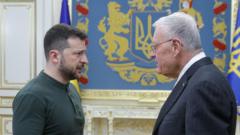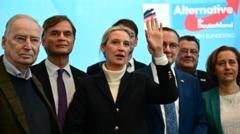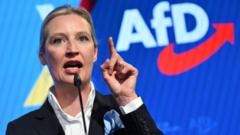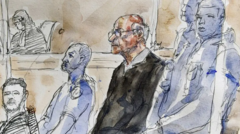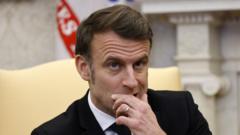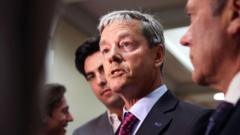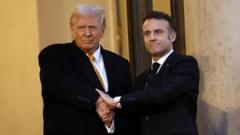In a last-minute effort to capture voter attention ahead of Sunday’s crucial elections, German political leaders are ramping up their campaigns to convey the importance of this decision for both Germany and Europe at large. Conservative frontrunner Friedrich Merz expressed confidence during party rallies, asserting that under his leadership, Germany would reclaim its role in Europe, ensuring that the far-right Alternative for Germany (AfD) would remain marginalized. While he wraps up the Christian Democratic Union's campaign in Munich, his opponents are engaging voters through innovative formats, including a "speed-dating" style TV event.
Final Countdown: The Fight for Votes in Germany's Pivotal Election

Final Countdown: The Fight for Votes in Germany's Pivotal Election
As Sunday's crucial election approaches, German leaders intensify their efforts to secure votes that could reshape Europe.
The political climate in Germany has been tumultuous, particularly following the collapse of the previous government, leaving many hopeful that the upcoming election could stabilize the nation. Key issues driving the campaign include economic recovery amid recession and rising concerns over migration and security in the wake of a series of violent attacks attributed to immigrants.
Recent polling shows that the nationalist AfD, led by Alice Weidel, has gained significant traction, typically capturing around 20% of voter support as she targets younger demographics through social media platforms. Weidel’s demands for stricter border security resonate with a faction of the electorate, but protests from opposition groups reflect a strong refusal to embrace her anti-immigrant sentiments.
Importantly, while mainstream political factions vow to keep the AfD out of government, the possibility of an increased seat count for them could stir upheaval in the 630-seat parliament. Merz’s potential partnership with the Social Democrats, led by Olaf Scholz, relies heavily on the engagement of undecided voters, a demographic that could sway the election outcome.
In his campaign, Merz emphasized the need for Germany to adopt an assertive international role amidst global shifts. He has faced mixed reactions, including protests against his past associations with the AfD, but remains committed in his assurance to voters that a coalition with the far-right is off the table.
As Germany gears up for the vote, stakeholders await the implications of this defining moment, which could not only affect national governance but also reverberate through the fabric of European politics.
Germany's political showdown this Sunday promises to yield significant repercussions—both domestically and across Europe—as tensions rise and the electorate prepares to make a historical choice.
Recent polling shows that the nationalist AfD, led by Alice Weidel, has gained significant traction, typically capturing around 20% of voter support as she targets younger demographics through social media platforms. Weidel’s demands for stricter border security resonate with a faction of the electorate, but protests from opposition groups reflect a strong refusal to embrace her anti-immigrant sentiments.
Importantly, while mainstream political factions vow to keep the AfD out of government, the possibility of an increased seat count for them could stir upheaval in the 630-seat parliament. Merz’s potential partnership with the Social Democrats, led by Olaf Scholz, relies heavily on the engagement of undecided voters, a demographic that could sway the election outcome.
In his campaign, Merz emphasized the need for Germany to adopt an assertive international role amidst global shifts. He has faced mixed reactions, including protests against his past associations with the AfD, but remains committed in his assurance to voters that a coalition with the far-right is off the table.
As Germany gears up for the vote, stakeholders await the implications of this defining moment, which could not only affect national governance but also reverberate through the fabric of European politics.
Germany's political showdown this Sunday promises to yield significant repercussions—both domestically and across Europe—as tensions rise and the electorate prepares to make a historical choice.






